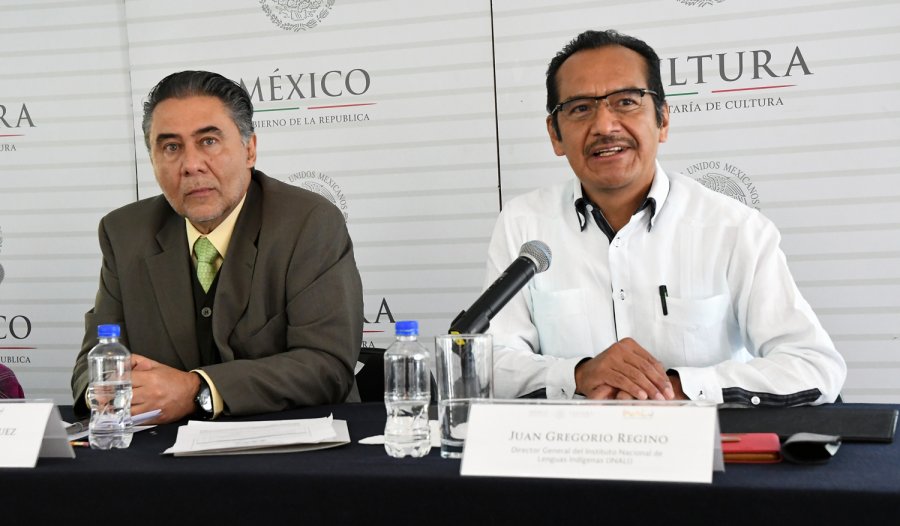Noticias
Presentation of the Mother Tongue International Day activities
February 15, 2018The International Mother Tongue Day will be the setting for strengthening a linguistic development plan through the Peninsular Congress for the Institutionalization of the Mayan Language, as well as the signing of a collaboration agreement between Quintana Roo, Campeche and Yucatan, places that bring together 860,000 speakers of this language.
Jorge Gutiérrez Vázquez, under-secretary of Cultural Diversity and Promotion of Reading; Juan Gregorio Regino, director of the National Institute of Indigenous Languages; Jaqueline Estrada Peña, director of the Institute of Culture and Arts of Quintana Roo, as well as José Miguel Rosado, representative of the Institute of Culture and Arts of Quintana Roo, and José Miguel Rosado, representative of the Institute of Culture and the Arts, were present at the press conference.
Jorge Gutiérrez said that as part of the General Law on Culture and Cultural Rights and the General Law on the Linguistic Rights of Indigenous Peoples, the Department of Culture of the Government of the Republic, through the National Institute of Indigenous Languages (Inali, for its acronym in Spanish), is promoting the generation of language policies in coordination with state and municipal governments so that, in absolute respect for the autonomies and customs of indigenous peoples, the right to education is guaranteed.
He said that Mexico is characterized by having 69 national languages (68 indigenous and Spanish), so it is among the first 10 countries with greater linguistic diversity in the world and ranks second with this characteristic in Latin America, after Brazil. In Mexico, 7 million people speak at least one indigenous language. According to INEGI figures, in 2015 over 25 million Mexicans were recognized as indigenous, most of whom are located in the southeastern part of the country, where the largest speaking population of these languages is registered. Nearly 860,000 people speak the Mayan language in Mexico, second only to Nahuatl.
Jorge Gutiérrez said that the Peninsular Congress for the Institutionalization of the Mayan Language will present the Regional Support Program for the Mayan Language, which aims to trigger policies for public and private institutions of the entities that make up the peninsula to accommodate the oral and written use of this language.
The Mayan Language Writing Standards, published in the Official Journal of the Federation on October 10, 2017, will also be presented at the meeting.
For his part, Juan Gregorio Regino, director of Inali, pointed out that one of the ways to avoid the loss of languages is to develop multilingualism, an action carried out by the institution in charge of it, through a national campaign, a project that has been joined by more than 100 institutions, with the intention of making the 69 national languages visible.
The goal is that languages transcend universities, with the purpose of positioning multilingualism in several territories, where 64 dialectal variants have been detected in danger due to the low number of speakers, which promotes linguistic normalization, he said.
"We are publishing these standards in the Official Journal of the Federation to have a legal instrument for our programs and projects. We are also generating public policies so that, for example, indigenous languages are recognized within the literary awards, which is beginning to permeate us, due to the presence of indigenous writers and editors at the country's main fairs”.
The director of Inali highlighted the support that the Department of Culture of the Government of the Republic has given to these projects and initiatives, which has meant progress in cross-cutting actions, such as the Peninsular Congress for the Institutionalization of the Mayan Language, which will allow an alternation with Spanish at an official level, in a policy of equality and integration.
"We seek that speakers feel proud to speak their language, that the children, young people and the people of the communities are the ones who assume as speakers the updating of their language, their neologisms and recovering words every day”.
Jaqueline Estrada Peña, director of the Institute of Culture and Arts of Quintana Roo, said that links have been established with authorities from Yucatan and Campeche to put the Mayan language on the academic and institutional scene because only in these places there are 150,000 speakers.
At the same time, José Miguel Rosado, representative of the Secretariat of Culture and Arts of Yucatan, mentioned that in social and linguistic terms these governmental efforts are important to normalize the use of mother tongues.
Mexico,Distrito Federal
